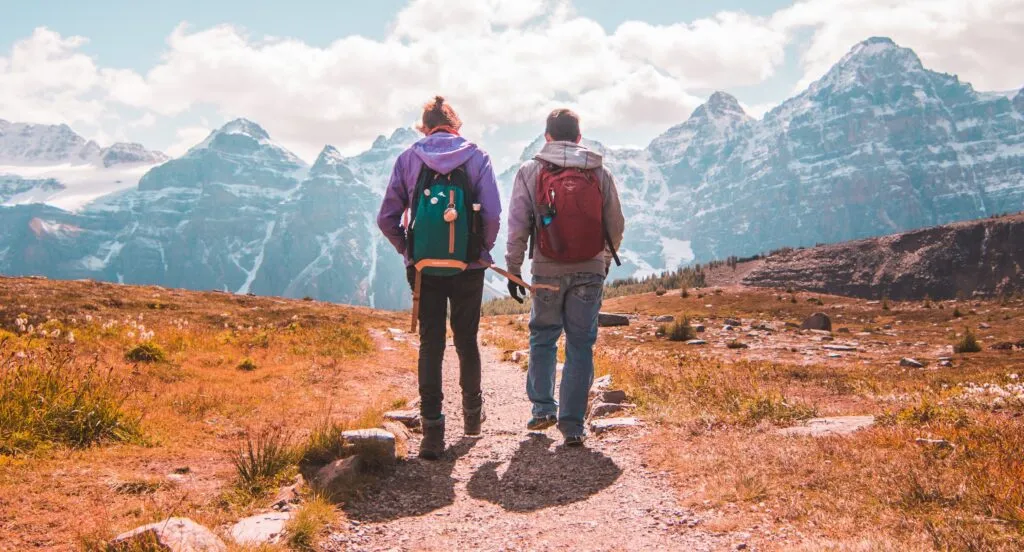As someone who has personally battled anxiety while discovering the transformative power of nature, I've learned that hiking and anxiety don't have to be enemies. Through years of trail experience and extensive research, I'll share proven strategies to help you conquer your fears and embrace the mental health benefits that await you in the wilderness. Welcome to Nature Guests, where your journey to wellness begins.
Understanding the Connection Between Hiking and Anxiety
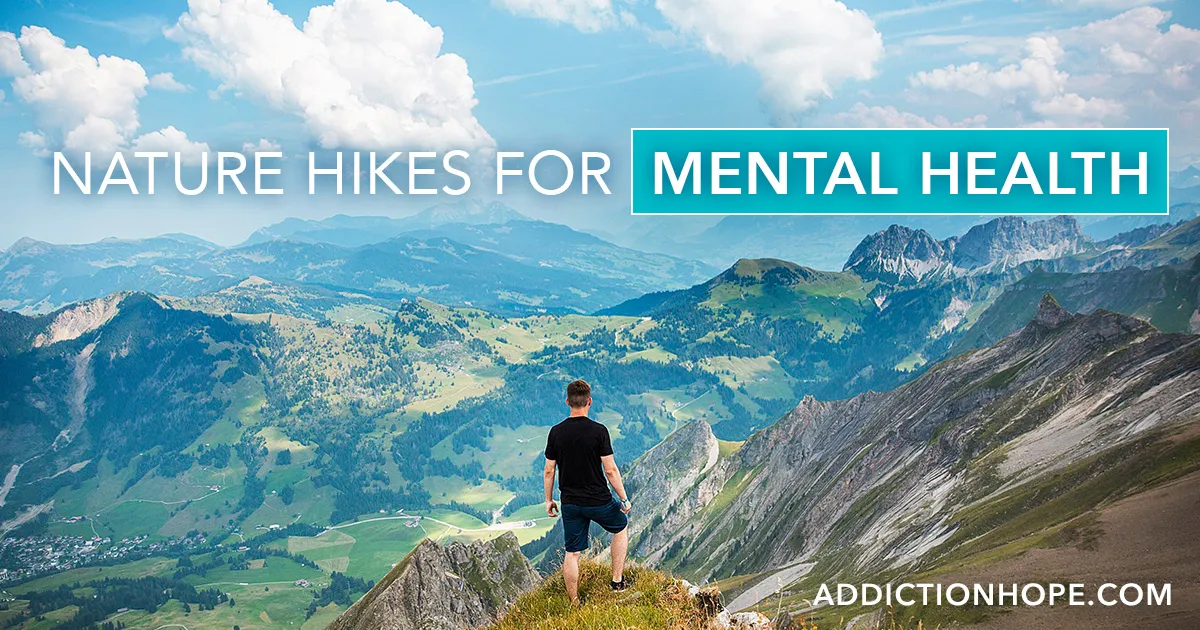
When I first started exploring the relationship between hiking and anxiety, I was skeptical about nature's ability to calm my racing mind. My initial hikes were actually anxiety-inducing experiences – the unfamiliar sounds, the physical exertion, and the fear of getting lost created more stress than relief. However, through consistent practice and proper preparation, I discovered that hiking became my most powerful tool for anxiety management.
The paradox of hiking and anxiety lies in understanding that while hiking can initially trigger anxious feelings, it simultaneously provides the perfect environment for healing. According to research from Stanford University, spending just 90 minutes walking in nature significantly reduces rumination – that endless cycle of negative thoughts that feeds anxiety. During my own journey, I noticed this effect after my third or fourth hike, when the mental chatter began to quiet and my focus shifted to the present moment.
What makes hiking particularly effective for anxiety is its multi-sensory nature. The rhythmic movement of walking creates a meditative state, similar to what many people experience when comparing hiking vs walking. The natural environment provides what environmental psychologists call "soft fascination" – gentle stimuli that restore mental energy without overwhelming the nervous system. This is why many people report feeling simultaneously energized and calm after a good hike.
The physical aspects of hiking also play a crucial role in anxiety management. Regular hiking helps regulate the body's stress response system, reducing cortisol levels and increasing the production of mood-stabilizing neurotransmitters like serotonin and dopamine. I've personally experienced how my anxiety symptoms diminished as my hiking fitness improved, creating a positive feedback loop that encouraged more outdoor adventures. Understanding this connection between hiking and anxiety was the first step in transforming my relationship with both fear and nature.
The Science Behind Nature's Healing Power
The scientific evidence supporting the mental health benefits of hiking is overwhelming and continues to grow stronger each year. When I began researching the connection between hiking and anxiety, I was amazed to discover how much legitimate research existed on this topic. The Japanese concept of "forest bathing" or shinrin-yoku has been extensively studied, revealing measurable decreases in stress hormones, blood pressure, and anxiety levels after just 15 minutes in a natural environment.
Neuroscientist Dr. Eva Detko's research shows that hiking activates the parasympathetic nervous system – our body's "rest and digest" mode – which directly counteracts the fight-or-flight response that characterizes anxiety disorders. During my conversations with park rangers in various national parks, I've learned that many now specifically recommend hiking as a complementary therapy for visitors dealing with stress and anxiety. This isn't just anecdotal evidence; it's backed by solid neuroscience.
One of the most fascinating aspects of the science behind hiking and anxiety is the concept of attention restoration theory. Urban environments demand what researchers call "directed attention," which depletes mental resources and increases stress. Natural environments, however, capture our attention effortlessly through what's termed "involuntary attention," allowing our directed attention systems to recover. I've experienced this firsthand during particularly stressful work periods when a simple trail walk would restore my ability to focus and think clearly.
The physical benefits of hiking also contribute significantly to anxiety reduction. Research published in the journal Environmental Science & Technology found that just five minutes of outdoor exercise can improve mood and self-esteem. The vitamin D production from sun exposure during hiking helps regulate mood, while the improved cardiovascular health from regular hiking provides a biological foundation for emotional resilience. When combined with proper hiking attire, these benefits are maximized through comfortable, confident outdoor experiences.
Preparing for Your First Anxiety-Free Hike
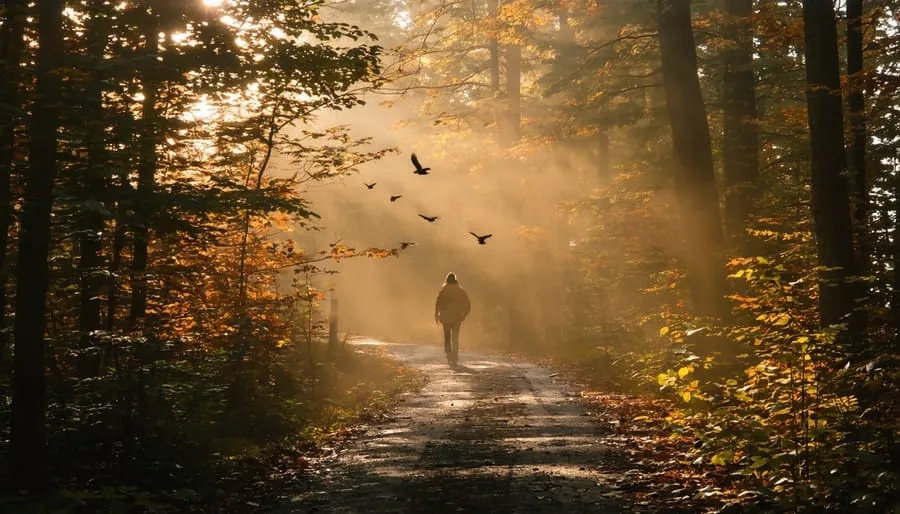
Preparation is absolutely crucial when addressing the relationship between hiking and anxiety. My first few hiking attempts were disasters precisely because I was unprepared – I chose trails that were too challenging, brought inadequate supplies, and had no clear plan for managing anxiety if it arose. Learning from these mistakes, I developed a systematic approach to hike preparation that has helped hundreds of people through my blog and local hiking groups.
Start by choosing beginner-friendly trails that match your current fitness level and comfort zone. I always recommend using apps like AllTrails to research trail difficulty, read reviews, and understand what to expect. For your first anxiety-conscious hike, choose a well-marked, popular trail close to parking areas. This reduces the fear of getting lost and ensures you'll encounter other hikers if you need assistance. During spring and fall seasons, I've found that trails offer the perfect balance of moderate weather and stunning scenery that naturally elevates mood.
Essential Pre-Hike Anxiety Management Checklist
- Practice deep breathing exercises for 10 minutes before departure
- Share your hiking plan with a trusted friend or family member
- Pack anxiety management tools (meditation app, calming music, journal)
- Bring more water and snacks than you think you'll need
- Download offline maps to your phone as backup navigation
Mental preparation is just as important as physical preparation when exploring hiking and anxiety. I developed a pre-hike ritual that includes reviewing the trail map, setting realistic expectations, and mentally rehearsing how I'll handle anxiety if it arises. This isn't about avoiding all discomfort – it's about building confidence through preparation. Consider starting with short nature walks in local parks before progressing to longer trail hikes, similar to how you might approach any new fitness routine.
Weather awareness plays a crucial role in anxiety-free hiking. I've learned to check weather forecasts not just for safety, but because certain weather conditions can trigger anxiety symptoms. Sunny, mild days tend to be most supportive for beginners, while overcast or windy conditions might feel overwhelming initially. Having a comprehensive hiking gear list ensures you're prepared for various conditions, which significantly reduces pre-hike anxiety about the unknown.
Essential Gear for Confident Hiking
Having the right gear dramatically reduces anxiety by building confidence and ensuring comfort on the trail. When I first started addressing hiking and anxiety, I underestimated how much proper equipment would impact my mental state. Quality hiking boots, in particular, provide the foundation for confident trail navigation and can make the difference between an anxious, uncomfortable experience and an empowering adventure.
🥾 Top Pick: NORTIV 8 Waterproof Hiking Boots
These highly-rated boots provide excellent ankle support and waterproof protection, perfect for building confidence on various terrains. With over 17,000 positive reviews, they're ideal for anxiety-conscious hikers seeking reliable footwear.
Shop Now on AmazonBeyond proper footwear, anxiety management tools can be seamlessly integrated into your hiking gear. I always carry a small mindfulness journal for recording thoughts and observations during rest breaks. This practice helps externalize worried thoughts and captures positive moments that can be revisited during future anxious periods. A quality daypack should include space for these mental health essentials alongside traditional hiking gear.
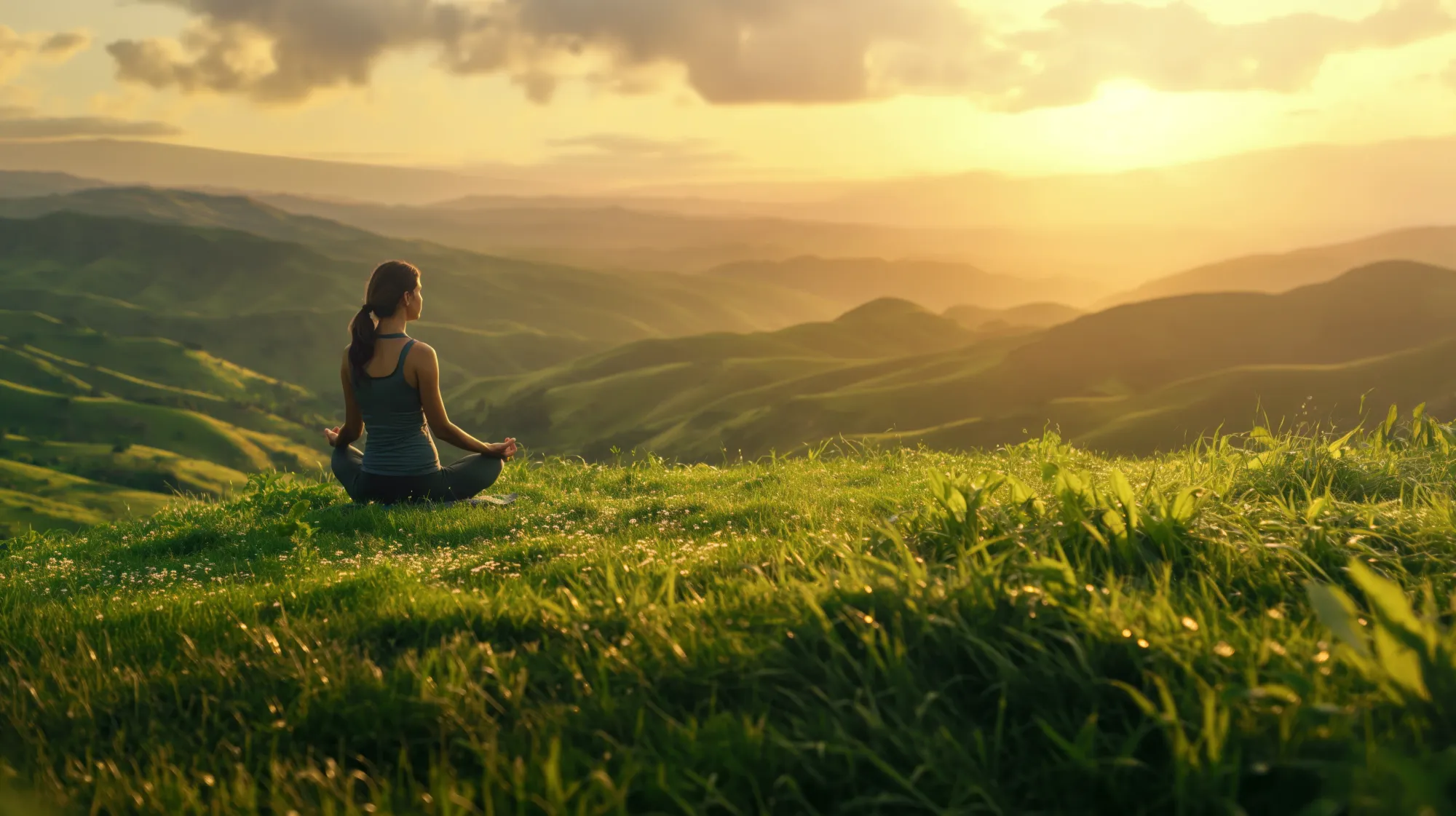
🧘 Mindsight Breathing Buddha Meditation Tool
This innovative guided breathing tool is perfect for trail-side anxiety management. Its visual cues help regulate breathing patterns and can be easily packed for outdoor meditation sessions during hikes.
Get Your Breathing BuddhaNavigation tools significantly reduce one of the most common hiking anxieties – the fear of getting lost. While smartphone apps are convenient, I always recommend bringing a physical map and compass as backup. Learning basic navigation skills before your first hike builds tremendous confidence and transforms the wilderness from a threatening unknown into a manageable environment. Quality hiking boots for beginners combined with reliable navigation tools create the perfect foundation for exploring the relationship between hiking and anxiety.
Emergency preparedness gear serves a dual purpose for anxious hikers – it provides practical safety benefits while offering psychological comfort. A well-stocked first aid kit, emergency whistle, and extra food and water create a safety net that allows you to relax and enjoy the experience. I've found that paradoxically, the more prepared I am for potential problems, the less likely I am to worry about them, which allows for a more mindful, anxiety-free hiking experience.
Mindfulness Techniques on the Trail
Integrating mindfulness practices into hiking creates a powerful synergy for addressing hiking and anxiety. The natural environment provides the perfect backdrop for mindfulness exercises, while mindful awareness enhances the therapeutic benefits of nature exposure. During my years of combining these practices, I've developed specific techniques that work particularly well on the trail and can be adapted for hikers of all experience levels.
📚 "Practicing Mindfulness" by Matthew Sockolov
This bestselling guide offers 75 essential meditations specifically designed to reduce stress and improve mental health. Perfect for developing mindfulness skills that translate beautifully to outdoor environments.
Learn Mindfulness TechniquesThe "5-4-3-2-1" grounding technique works exceptionally well on hiking trails when anxiety begins to surface. This involves identifying five things you can see (perhaps different tree species, rock formations, or cloud patterns), four things you can touch (trail surface, tree bark, your hiking poles), three things you can hear (wind, bird songs, your footsteps), two things you can smell (pine, earth, fresh air), and one thing you can taste (the freshness of mountain air or water from your bottle). This technique anchors attention in the present moment and leverages the rich sensory environment that makes hiking and anxiety management so effective.
Walking meditation transforms ordinary hiking into a moving mindfulness practice. I teach hikers to coordinate their breathing with their steps – perhaps breathing in for three steps and out for three steps, or whatever rhythm feels natural. This creates a meditative cadence that naturally calms the nervous system. During steeper sections, the breathing naturally deepens, which can actually enhance the anxiety-reducing benefits. The key is maintaining gentle awareness of the breath-step coordination without forcing any particular pattern.
Nature observation practices cultivate what psychologists call "soft fascination" – the type of gentle attention that restores mental energy rather than depleting it. I encourage hikers to periodically pause and spend several minutes simply observing their surroundings without judgment or analysis. Notice the patterns of light filtering through leaves, the texture of bark, or the movement of insects. This practice naturally interrupts anxious thought patterns while building appreciation for the natural world that supports the healing aspects of hiking and anxiety work.
📖 "My Pocket Meditations for Anxiety"
This compact guide provides anytime exercises perfect for trail-side anxiety relief. Its portable format makes it ideal for hiking adventures when you need quick access to calming techniques.
Get Pocket MeditationsOvercoming Common Hiking Anxieties
Throughout my journey exploring hiking and anxiety, I've encountered virtually every common fear that prevents people from embracing outdoor adventures. The fear of getting lost, encountering wildlife, experiencing panic attacks on the trail, or being unable to complete a hike are all legitimate concerns that deserve thoughtful attention rather than dismissal. By acknowledging these fears and developing specific strategies to address them, we can transform obstacles into stepping stones toward greater confidence and mental wellness.
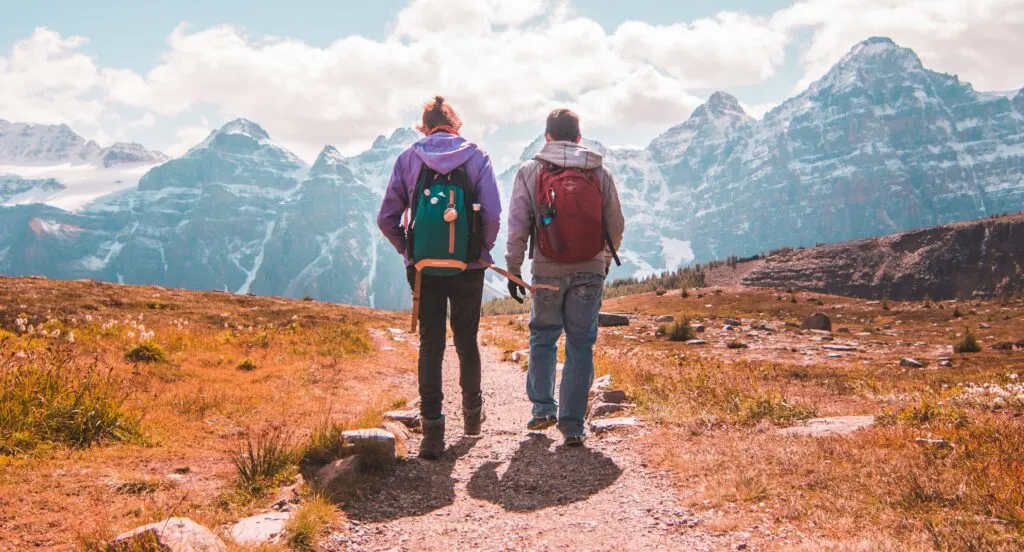
The fear of panic attacks while hiking is particularly challenging because it creates a cycle where anxiety about having anxiety actually triggers the very symptoms we're trying to avoid. I've learned to reframe panic attacks as temporary experiences that, while uncomfortable, are not dangerous. Developing a specific action plan for managing panic on the trail – finding a safe place to sit, using breathing techniques, and reminding myself that the feeling will pass – has made the difference between avoiding trails altogether and embracing them as healing spaces.
Wildlife encounters represent another common anxiety trigger that can be addressed through education and preparation. Most wildlife actively avoids humans, and understanding basic wildlife behavior dramatically reduces fear. I always research the specific animals I might encounter in each region and learn appropriate responses. Carrying bear spray in bear country, making noise while hiking to avoid surprising animals, and knowing how to properly store food all build confidence while demonstrating respect for the natural environment that makes hiking and anxiety management so effective.
Physical capability concerns often stem from comparing ourselves to experienced hikers or social media representations of hiking. I emphasize that every hiker started as a beginner, and there's no shame in choosing easier trails, taking frequent breaks, or turning back if needed. Building hiking fitness gradually while celebrating small victories creates a positive relationship with outdoor challenges. This approach aligns with the broader principles of anxiety management – progress over perfection, self-compassion over self-criticism.
Social anxiety around other hikers can be addressed by understanding trail etiquette and recognizing that the hiking community is generally supportive and friendly. Most hikers are happy to offer assistance or encouragement, and understanding basic trail courtesy (like yielding the right of way uphill) helps build confidence in trail interactions. Consider exploring this wonderful resource on hiking and anxiety for additional strategies and community support from fellow hikers who understand these challenges.
Conclusion
The journey of understanding hiking and anxiety has been one of the most transformative experiences of my life, both personally and professionally. What began as a struggle to manage my own anxiety symptoms evolved into a deep appreciation for nature's therapeutic power and a mission to help others discover these benefits. Through years of trail experience, research, and conversations with fellow hikers, I've learned that the relationship between outdoor recreation and mental health is not just scientifically supported – it's deeply personal and profoundly healing.
The evidence we've explored demonstrates that hiking offers a unique combination of physical exercise, mindfulness practice, and nature exposure that specifically addresses the mechanisms underlying anxiety disorders. From the Stanford research on rumination reduction to the Japanese studies on forest bathing, science consistently supports what many of us have experienced firsthand – that time spent mindfully moving through natural environments provides relief that extends far beyond the duration of the hike itself.
Perhaps most importantly, exploring hiking and anxiety has taught me that healing doesn't require perfection. You don't need to be fearless, super fit, or highly experienced to benefit from outdoor adventures. Some of my most profound breakthroughs have come from imperfect hikes – times when I felt anxious, needed to rest frequently, or didn't reach my intended destination. These experiences taught me that the goal isn't to eliminate anxiety completely, but to develop a healthier relationship with it while building confidence through consistent, gentle exposure to new challenges.
As you begin or continue your own journey with hiking as anxiety therapy, remember that every step forward is progress worth celebrating. Start where you are, use what resources you have, and do what you can. The trails will be there waiting for you, offering their quiet invitation to discover not just the beauty of the natural world, but the resilience and peace that already exist within you. Your adventure toward greater mental wellness and outdoor confidence begins with a single step – I encourage you to take it.
Start Your Hiking Journey Today
Ready to experience the mental health benefits of hiking for yourself? Browse our comprehensive guides and gear recommendations to begin your transformation.
Explore More Guides

